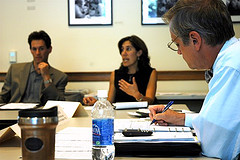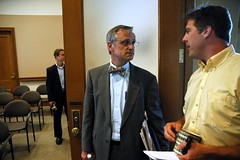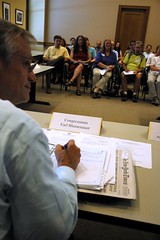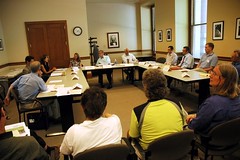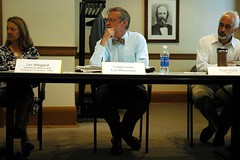On Tuesday, U.S. Congressman Earl Blumenauer led a roundtable discussion about bicycles at Portland’s City Hall.
His goal for the event was to get a “reality check” on the latest bike happenings in Portland by listening to short presentations from local bike experts and insiders.
But before letting everyone chime in, Blumenauer spoke about his progress with the Bike Commuter Act (it’s now officially in the Energy Bill) and his work in making the Capitol more bike-friendly.
Blumenauer also mentioned how he has closed the tax loophole for Hummers, which he called, “The most egregious motorized vehicles ever created.”
After Blumenauer’s intro, we heard from City Commissioner Sam Adams. Adams said “we’re in the throes of a once in a generation opportunity” to improve biking and that his office is,
“digging in deep on the issues…spending a lot of time on polling and focus groups to get underneath the buzzwords, political correctness and sloganeering that comes with any initiative that tries to find out what it would take to get our (bike) ridership up.
We have to have a better understanding than just ‘more infrastructure and improved safety’.”
And Adams offered his thoughts on what might come from the bike master plan,
“I think that you’re going to see an adoption of our version of world-best practices…everything from separated bicycle paths to much more aggressive bicycle boulevards.”
He said the Bike Master Plan will give us a, “very effective mandate to get more resources for the effort,” and that he plans to,
“move bicycling forward under the rubric of safety and in 2-3 years we are going to be doing things no one imagined we could do.”
Up next was Mia Birk, a principal with Alta Planning and Design. She shared her efforts to create bike count programs in various cities (the lack of which has long been a major barrier for advocates and planners). Working with researchers at PSU’s Institute for Bicycle and Pedestrian Innovation Birk wants to develop a national bike count database that will effectively influence planning models.
Scott Bricker of the BTA gave Earl an update on their bicycle boulevard campaign, spoke of the “great momentum” from the recently ended legislative session, and said improving safety is the main “driver” of all the BTA’s work.
Metro Councilor Rex Burkholder was up next and he stressed that “Portland can’t be the exception with all this,” and that we should not lose focus on the entire region.
Speaking up for off-road bicycling (or the lack thereof) in Portland was Chris Distefano of Chris King Precision Components. Distefano — whose job description now includes mountain bike advocacy — has become a powerful voice for creating more off-road recreational riding opportunities within city limits.
Much like his speech at the Bicycle Advisory Committee in May, Distefano made a compelling case for Portland to be more aggressive in adding off-road miles to the bike network.
Distefano also shared that he is close to launching a new, policy-based mountain bike advocacy group in Portland (more details coming soon).
PDOT bike coordinator Roger Geller spoke with guarded optimism about his effort to make Portland a “world-class bicycling city in an American context.” Geller said he looks to the Dutch for inspiration,
“We look to the Dutch…and what they’ve done is make bicycling the best option for getting around town and that’s what we’re working to do.”
But he warned that Portland faces challenges to realizing the Dutch dream,
“There are federal standards barriers, regional funding barriers, and local barriers in terms of our policies…some of the things that we want to do will come right up against policies that will – in one way or another – tell us we can’t do it.”
Geller credited the “initiative and focus” of Commissioner Adams in helping bicycle advocates and PDOT staff “break out of the poverty mentality”,
“In the past, we’ve been happy to settle for the crumbs. We were happy to just have bike lanes…if they dropped off before the intersection that was OK, if they were a little narrow, that was OK. But now we’re hearing from people that they are not satisfied. Sam’s initiative and focus on bicycling is helping us adopt a no more crumbs approach. We want the best, we want world-class facilities…to get there requires a rethinking of funding and a rethinking of policies and I think those will be our biggest challenges.”
I was up after Geller.
I tried to share a sense of the upwelling in positive energy and activity from the grassroots. I touched on things like the success of Pedalpalooza and the Naked Ride, the community’s feelings about police enforcement practices, and the cross-pollination going on between the various facets of our bike culture.
Other speakers included Cycle Oregon president Jerry Norquist, State Representative Tobias Read and PSU researcher Lyn Weigand.
Norquist touched on the success of the recent Cycle Oregon Weekend Ride and said that there’s “a buzz about cycling” in rural communities throughout Oregon who see bike tourism as a road to economic development.
Read recapped the legislative session and said he was “surprised and disappointed” by the reaction to various bike bills by some of his fellow lawmakers, noting a clear divide between rural and urban representatives.
Weigand is part of PSU’s recently launched Institute for Bicycle and Pedestrian Innovation which she said hopes to “make bicycle and pedestrian travel a mainstay of our transportation system,” by focusing on research, knowledge transfer and education.
Blumenauer closed the discussion by asking the assembled experts to help him “think strategically about the new Transportation Bill and what we get out of that.”
All in all, I felt it was a productive and important discussion. I was pleased to hear a healthy balance of back-patting and appreciation for our current accomplishments while still making a clear case that we have a long ways to go.
The good news is that the people around the table are highly qualified, motivated, and excited to get us there.
